- Home
- Simon Kernick
Relentless: A Novel Page 24
Relentless: A Novel Read online
Page 24
‘Armed police!’ Bolt screamed again, and shot Lench in his left eye. Blood sprayed the grass behind his head, and he went into convulsions.
At the same time, the DI threw the Walther PPK on the ground next to the dying man’s uninjured arm and reached into his pocket for his mobile. He speed-dialled Mo Khan’s number, willing his partner to pick up the phone.
He did, after three rings. Once again the noise of kids filled the background.
‘Hello, boss, any news?’
Bolt spoke rapidly. ‘Call nine-nine-nine anonymously and tell the police that you’ve just seen two young children being manhandled into a flat at twenty-four Limestone Street in Hendon, and you’re absolutely sure that they’re being held against their will. Have you got that?’
‘No problem. Do you want me to go over there?’
‘Yes, go and check the place out, but don’t get involved unless there’s no choice.’ He could hear cars pulling into the driveway at the front of the house now. ‘And one other thing: we never had this conversation. Understand?’
‘Sure, boss, whatever you say.’ He hung up without another word.
Bolt exhaled loudly. Mo would do what he’d been requested to do, he was sure of that. But their relationship had, in those few moments, changed for ever.
He put the mobile back in his pocket and turned away, feeling unsteady on his feet. He couldn’t believe what he’d just done. It made him want to throw up, but he held himself together, knowing that only by keeping his wits about him was he going to get out of this situation in one piece.
He clambered over the fence and began to walk slowly up the garden towards the two black-clad armed police officers moving carefully towards him, rifles outstretched.
48
I was at the front of the house, holding Kathy tightly, telling her that the plainclothes cop who’d rescued us would find out where Chloe and Max were being held while praying I was right, when two police cars pulled into the driveway, sirens blaring, followed by an ambulance. All three vehicles screeched to a halt and three guys with rifles who looked like something out of Robocop jumped out of the first.
‘We’ve had an emergency call,’ shouted one of them, a bullet-headed guy in his thirties. ‘Can you please put your hands on your heads and step apart.’
‘It’s not us,’ shouted Kathy in return, her face dirty and tear-stained. ‘They’re at the bottom of the garden.’
‘Please do as we say, madam,’ demanded the cop, remaining about twenty feet away. Although his weapon wasn’t trained on us, it wasn’t exactly pointed away either. Behind him two more officers, unarmed this time, stepped out of the other car. The ambulance crew remained in their vehicle. More sirens blared in the near distance.
We followed their instructions and kept our hands firmly on our heads. It struck me that this was the fourth time in less than twenty-four hours that someone had pulled a firearm on me.
‘Now, can both of you get down on your knees, please?’
Kathy cursed audibly. She’d always had a rebellious attitude to the police, her being a college lecturer and all. But these guys didn’t look like they were in the mood to be argued with, and I was long past arguing anyway. I went down to my knees, and a second later she followed.
‘Is anyone hurt?’ asked the cop.
‘We’re OK,’ I answered, ‘but the detective who rescued us ran round the back after the man holding us.’
‘He’s got our kids,’ added Kathy. ‘The man who was holding us has got our kids. Please make sure you don’t kill him.’
‘Is he armed?’
‘Yes,’ we both said. ‘And there’s another man in the cottage as well,’ I added, ‘but he’s unarmed. And hurt.’
‘Has he been shot?’
‘No.’
‘We had reports of a gun battle. Who else was involved?’
I briefly told him what had happened, and he gave me a puzzled look, as if he couldn’t imagine a man like me with a gun. I could see his point.
‘OK, we’re going to secure the area,’ he told us. He then spoke hurriedly to his two armed colleagues, who disappeared round the back of the house.
Meanwhile a police Range Rover had pulled up on the side of the road outside and disgorged a further three armed officers. They came onto the drive and, after speaking to the bullet-headed cop, two of them peeled off and came over to me. I was told to get to my feet again and was quickly and silently frisked for weapons. ‘He’s clear,’ called out one of the officers, and I was told I could go, although quite where I wasn’t sure.
I walked forward and waited while an unarmed female officer who’d appeared out of nowhere quickly frisked Kathy. She gave her the all-clear and the two of us were led over to the ambulance, where the two-man crew asked if we were all right.
‘We just want our kids,’ I said, looking back over my shoulder.
‘I’m sure they’ll be fine,’ said the older of the two.
‘How the hell do you know?’ demanded Kathy.
His colleague, a stocky guy in his twenties with a South African accent, told her that the police were doing all they could. His voice was soft and soothing, and as he spoke he sat Kathy down on the driver’s doorstep and crouched down to check her out. I hoped he was right. When the detective who rescued us had told me to get Kathy back to the house, there’d been something in his lean, scarred features and sky-blue eyes I don’t think I’ve seen too many times before. It was moral strength. This guy had signalled to me that he could handle things. That he would somehow make the cold-hearted thug talk. I’d known better than to doubt him.
But had he succeeded?
The older ambulanceman had an arm on my shoulder and was offering me a bottle of water. I took it with a nod of thanks and drank deeply, still looking back towards the house.
And then the detective came round the corner, several inches taller than the two armed officers flanking him. One of them was holding the pistol with the silencer in one hand. The detective’s eyes met mine and he looked grim-faced.
‘Did he tell you where my kids are?’ I asked, breaking free from the ambulanceman.
The armed cop who wasn’t holding the pistol put out an arm to move me aside, but I brushed it away and stopped in front of him.
The detective stopped too. We were only three feet apart.
‘He was armed. I had no choice but to shoot him.’
‘Is he dead?’ I asked incredulously.
He nodded. ‘I think so. I’m sorry.’
I charged forward before either of the two cops could stop me, grabbing the detective by the collar and shoving my face towards his. ‘Bastard!’ I shouted, but I made sure my ear was by his mouth so he could speak.
He said three words that filled me with elation: ‘I’ve sorted it.’ Then something that sounded like ‘I’ve got a guy going over there.’
I was pulled off him and shoved away violently by one of the armed cops. Kathy came running up to me.
‘What’s happened? What the hell happened?’
I yanked her as far away from any witnesses as possible. ‘Act upset,’ I hissed at her, and she seemed to understand. ‘He says it’s sorted, that Lench told him where the kids are. He’s got someone going over there.’ I pulled her close and whispered that Lench was dead.
‘Good,’ she said, and then, with an acting skill that I have to say surprised me, she fell to her knees, crying.
Seconds later, the South African ambulanceman was down comforting her and he and the woman police officer who’d searched her a couple of minutes earlier helped her to her feet.
I turned away and saw our detective being put into one of the police cars and the pistol with the silencer being bagged by an officious-looking man in a raincoat who’d also appeared from nowhere. The bottle of water was still in my hand and I took another long drink, hoping he’d be all right.
But had I been a betting man I wouldn’t have put money on it.
49
Mo Khan pull
ed into Limestone Road just before ten, a little over twenty-five minutes after Bolt had called him. It was a quiet residential road of postwar semi-detached housing that had probably seen better days, and straight away he saw a small cluster of police cars and ambulances double-parked on the right-hand side about halfway up. They were blocking the road and it was obvious there was no way past, but Mo drove up anyway.
A young uniformed officer broke off from a small knot of police gathered round the back of one of the ambulances and walked into the middle of the road, holding up his hand. His expression was irritated. Mo came to a halt a few feet in front of him and let down his window. The officer came up to the driver’s side and Mo gave him a disarming smile.
‘Excuse me, officer, I live down here. Is there a problem?’
The officer lost his irritated look. It was, thought Mo, always amazing what politeness could do to win people over.
‘I’m sorry, sir, there’s no access. We’ve got an operation ongoing.’
Mo feigned surprise. ‘Nothing serious, I hope? This has always been a quiet street, and I’ve got kids. I wouldn’t like to think there’s anything going on that could affect them.’
‘It’s nothing for you to worry about, sir. I can promise you that.’
‘It’s not drugs, is it? Tell me it’s not drugs.’
The officer leaned down closer and gave him a conspiratorial look. One man to another. ‘To be honest, it looks like a home-alone case. A couple of children were left in the house down there. Young ones.’
‘God, how awful,’ said Mo. ‘Who the hell would do something like that?’
‘Well, we got an anonymous call from someone who said he saw them being dragged into the house. That’s why we’ve turned up in force.’
‘They’re OK, though, are they? The kids?’
‘They’re fine. A bit upset, as you’d expect, but no physical injuries. They’re in the back of the ambulance at the moment, but there was no-one in the house with them. I think it must have been a concerned neighbour who called, and he said that it was a kidnap just to make sure we turned up.’ He shrugged his shoulders to signify that this explanation would satisfy him.
‘As long as they’re all right, that’s the main thing,’ said Mo. ‘Thanks for letting me know.’
He said his goodbyes and reversed up the road. He’d done what his boss had asked him to do, but he now wondered what on earth had happened to lead the DI to the two kidnapped children. He guessed that they were the Merons’ kids, but the way this investigation had twisted and turned he wouldn’t have been surprised if they’d turned out to be Lord Chief Justice Parnham-Jones’s illegitimate children from an affair with the Prime Minister’s wife.
Mo had known Mike Bolt for over two years. He trusted him completely and had always been loyal to him. Even so, he was worried. The boss had insisted he make the call to the police anonymously, rather than go through the established channels. There would only have been one reason for this: Bolt didn’t want anyone to know that it was he who’d got this information. Which meant that he had to have got it illegally.
Mo wasn’t naive enough to think that corners never got cut in the pursuit of results. They did. He’d cut them himself on occasion. So had the boss, who because of his background in the Flying Squad had come up against some pretty vicious villains. But something in his tone of voice when he’d called Mo, the quiet desperation underlying the curtly delivered orders, made him feel that this time it was different. That this time the corners had been cut drastically. He’d reserve judgement until he found out more, but he didn’t like the feeling he was getting.
As he drove, he called the boss’s mobile on hands-free for an update on the situation, but it was switched off. He didn’t leave a message.
Someone had once said to him that a man’s first loyalty was to his family, his second to his friends. The authorities, the state, the law, all of these came a long way down the list. But this wasn’t what concerned Mo Khan. Mike Bolt was his friend, but if he had to lie to protect him and by doing so perjure himself, would he not be risking his career, and therefore the wellbeing of his family?
It was a choice he hoped he didn’t have to make.
50
The next hour passed in a blur. Kathy and I were both given a cursory examination at the scene by a white-haired doctor who kept muttering to himself. He pronounced us both fit and well, which suggested a lack of observational skills on his part, before disappearing round the back of the house to take a look at Lench.
Kathy was then arrested by the officious-looking detective in the raincoat on suspicion of the murder of Vanessa Blake. She tried to protest, but did so without looking at me, and she didn’t resist as she was led away. She was driven off in a marked police Escort with me following in a separate car. I was informed that we were both being taken for separate questioning at Reading police station. Officers from Reading CID wanted to interview me about what had happened at the house; Southampton CID were also interested in having a chat about events at our cottage the previous night. Apparently, the body of a man had been pulled from the wreckage and they wanted, quite reasonably I suppose, to find out how he’d got there. I asked about Daniels but neither of the officers driving me knew anything about that. I assumed that meant he’d escaped. I hoped so. There’d definitely been something not quite right about him, but he’d saved my life at least once, possibly twice, and you’ve got to give a person credit for that.
Five minutes from the station, as I sat in the back of the car, still trying to come to terms with the fact that I’d beaten a hardened criminal senseless and traded gunfire with a proven killer, the police radio crackled into life, the voice on the other end asking the driver if I was in the car. The driver said I was, and the voice then informed us that Max and Chloe had been found safe and well at an address in Hendon and had been taken to the Royal Free Hospital as a precautionary measure. As soon as I heard that, I’m not ashamed to admit that I cried for the second time that day, so huge was my relief.
‘It’s OK,’ said the officer in the front passenger seat, putting a hand on my shoulder. ‘Let it all out.’
So I did.
51
At the station, I was given a cup of strong black coffee and told that the body of Irene Tyler, my formidable mother-in-law, had been discovered in the bedroom of the house where Kathy had grown up. We’d never got on, as I’ve already said, but the news still hit me hard. Harder, I think, than I would have expected. It was one more tragedy in a twenty-four hours that had been full of them. They wouldn’t tell me how she’d died, just that they were treating it as suspicious.
After I’d finished the coffee I was taken to one of the interview rooms, where a male and a female detective wanted to hear everything that had happened to me since my release from custody the previous evening. They said that as soon as I’d finished I’d be taken back to London and reunited with my children. ‘What about my wife?’ I asked, but they wouldn’t answer that one, so I let it go, and just told them the whole story. Occasionally they stopped me to request certain details or to get clarification of one of my points, but for the most part they just let me talk, expressing no obvious scepticism at my version of events, even when I told them how I’d shot at Lench in self-defence, wounding him in the foot. I thought they’d ask me more about the detective and how he’d come to kill Lench, but they skirted around that particular topic, so I volunteered the information that the detective had chased him and that Lench had been armed, adding that neither Kathy nor I had seen what happened after that. I hoped that this way I was helping him.
As for Kathy’s role in the whole thing, I told the truth, mainly because I didn’t see any alternative. I said she’d been having an affair with Jack Calley and that he had given her the key to a safety deposit box which apparently contained something from one of his clients. Other people had clearly been very interested in getting hold of it, and had tortured then murdered Jack in an effort to find the box’s lo
cation. They’d then come after Kathy and me, and had finally caught us.
‘And you have no idea what the safety deposit box contained?’ asked the female detective, a DI in her forties with a severe haircut that didn’t match her personality.
‘It’s something you can make copies of,’ I said, remembering Lench’s earlier interrogation of Kathy.
‘And do you think your wife knows?’ pressed the female detective.
‘No,’ I answered, but in reality I wasn’t so sure.
‘What about the client? Have you any idea who he, or she, might be?’
I shook my head. ‘The only names I was given were Daniels, the undercover cop; Mantani, who was one of the people who kidnapped me; and Lench. He was the one who got killed this morning.’
‘How do you know he was killed?’ asked the male detective, a much younger guy with a very high hairline and the air of someone who felt sure he was going places a lot more important than a provincial copshop. He reminded me a little of my boss, Wesley ‘Call me Wes’ O’Shea. A smug, self-righteous go-getter who, if he’d been in the military, would undoubtedly have been shot by his own men.
‘The detective who rescued us told me at the scene.’
The two of them turned to each other, then back to me. I looked at my watch. It was ten past eleven. I’d been in this room for three quarters of an hour and I was suddenly exhausted.
‘I’ve told you everything I know,’ I said wearily. ‘I just want to see my kids.’
The female detective nodded. ‘OK. Interview suspended at 11.11 a.m.’
‘By the way,’ I said, ‘before you turn the tape off I just want to say that my wife did not have anything to do with Vanessa Blake’s death. The man who attacked me in the library, and who was armed with the murder weapon, killed her.’
‘We’ll let the investigating officers on the case know your comments,’ she told me sympathetically. ‘Thanks very much for your co-operation.’

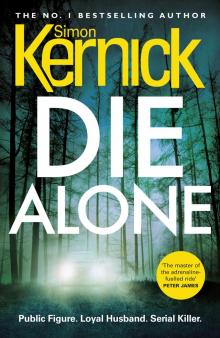 Die Alone
Die Alone Deadline
Deadline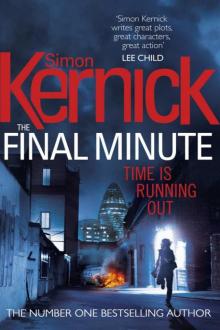 The Final Minute
The Final Minute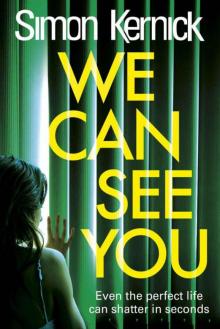 We Can See You
We Can See You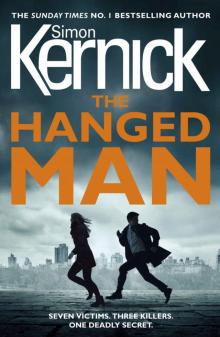 The Hanged Man (Bone Field 2)
The Hanged Man (Bone Field 2)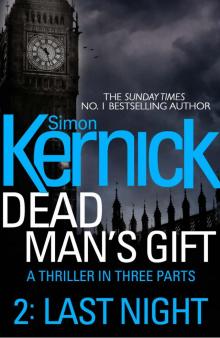 Dead Man's Gift 02 - Last Night
Dead Man's Gift 02 - Last Night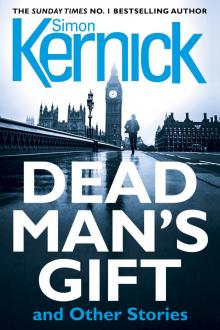 Dead Man's Gift and Other Stories
Dead Man's Gift and Other Stories A Good Day To Die
A Good Day To Die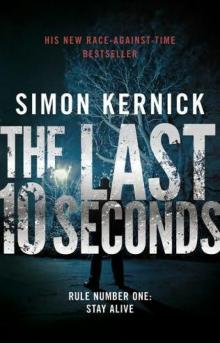 The Last 10 Seconds
The Last 10 Seconds The Murder Exchange
The Murder Exchange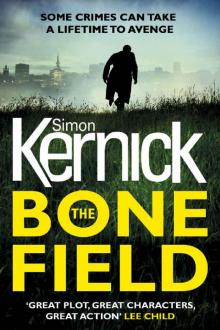 The Bone Field
The Bone Field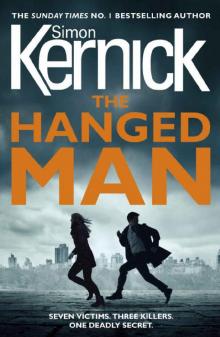 The Hanged Man
The Hanged Man Target
Target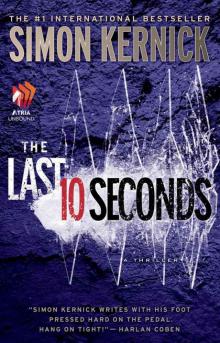 The Last 10 Seconds: A Novel
The Last 10 Seconds: A Novel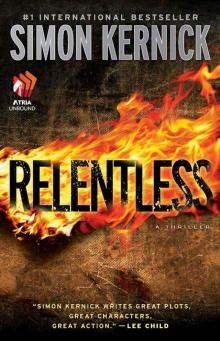 Relentless: A Novel
Relentless: A Novel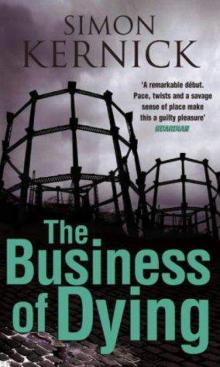 The Business Of Dying
The Business Of Dying Die Twice
Die Twice Flytrap
Flytrap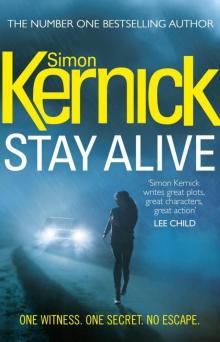 Stay Alive
Stay Alive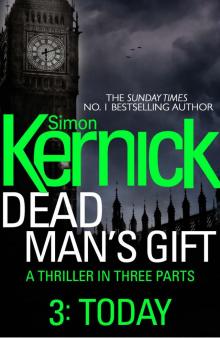 Dead Man's Gift 03 - Today
Dead Man's Gift 03 - Today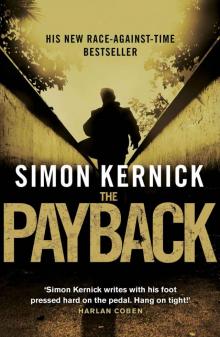 The Payback
The Payback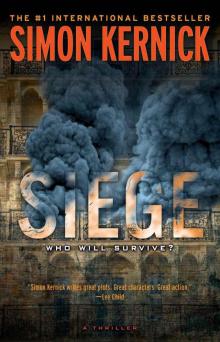 Siege: A Thriller
Siege: A Thriller The Crime Trade
The Crime Trade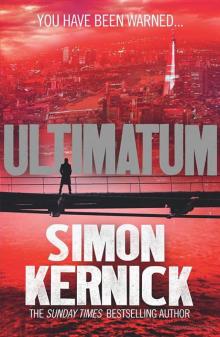 Ultimatum
Ultimatum